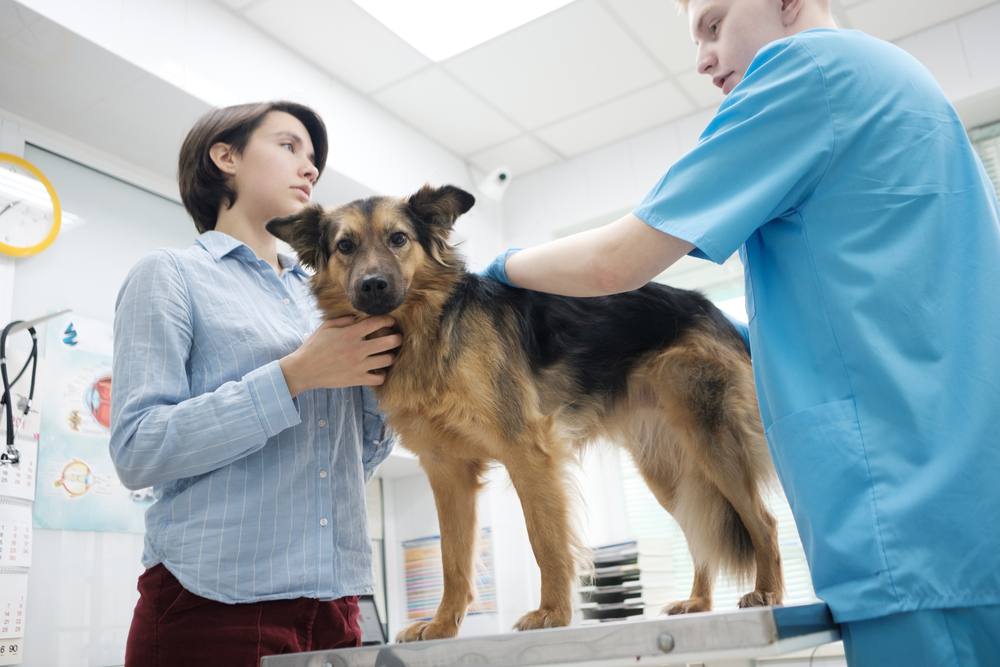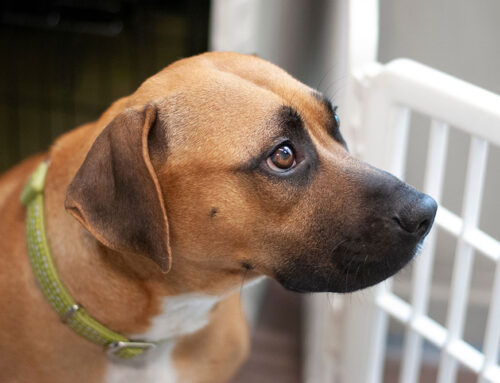Itchy Paws? Sneezing Pets? Seasonal Allergies in Houston Explained
When spring’s oak pollen clouds the Houston air or late-summer ragweed takes over, our pets often suffer as much as we do. Instead of enjoying the season, many dogs and cats are kept up at night by constant itching, paw licking, or endless sneezing. What starts as a seasonal nuisance can quickly turn into a chronic health concern if left untreated.
At Memorial Villages Animal Hospital, we believe pets deserve relief from allergy misery. With an accurate diagnosis and a customized treatment plan, we can help your furry family members breathe easier, feel better, and get back to enjoying their favorite outdoor moments.
Why Houston Pets React So Strongly
Houston’s unique climate creates an ideal environment for airborne allergens nearly year-round. Here’s how common triggers affect local pets:
| Environmental trigger | Peak season | Typical pet reaction |
| Oak, elm, and other tree pollens | February to April | Runny eyes, sneezing |
| Grass pollens | April to June, again in September | Paw chewing, belly rashes |
| Ragweed and weed pollens | August to November | Ear infections, skin hives |
| Mold spores on humid days | Spikes throughout the year | Facial itching, hot spots |
High humidity keeps allergens airborne longer, and frequent rainfall encourages mold growth. Breeds like Bulldogs, Retrievers, and Terriers are especially prone to environmental allergies, but any pet can be affected when pollen levels spike.
Early Warning Signs to Watch For
Seasonal allergies can affect the skin, respiratory system, or even the digestive tract. Spotting symptoms early allows you to intervene before your pet’s discomfort worsens.
Skin and Ear Clues
- Repeated scratching or rubbing, especially along the flanks
- Red, warm ears with a yeasty odor
- Hair loss or scaly patches, often around the tail base
- Hives or raised bumps, particularly in short-haired pets
Respiratory Symptoms
- Episodes of reverse sneezing
- Watery nasal or eye discharge
- Snoring caused by swollen nasal passages
Digestive Signs
- Loose stools following outdoor play
- Intermittent vomiting from licking irritated skin
Acting at the first sign of discomfort helps prevent the scratch-lick-infection cycle that deepens inflammation and delays healing.
Your Pet’s Diagnostic Road Map
Getting to the root of your pet’s allergies is key to managing them successfully. During your visit, we may recommend:
- A full history of diet, environmental changes, and recent products used in the home
- A physical exam of paws, ears, and skin folds to check for signs of infection
- Cytology or culture via skin or ear swabs to detect parasites, yeast, or bacteria
- Intradermal or serum allergy testing to identify specific environmental triggers
- Additional diagnostics such as skin scrapings or diet trials to rule out parasites or food hypersensitivities
Whatever your pet needs, Memorial Villages provides a complete lineup of services with compassion and expertise. New clients can also take advantage of our first exam offer.
Treatment Toolbox: A Multi-Layered Approach
Allergy management rarely relies on one medication alone. We build personalized treatment plans that combine medical therapy, lifestyle changes, and long-term prevention.
Medical Therapies
- Antihistamines help control mild, intermittent symptoms
- Apoquel or Cytopoint can interrupt the itch signal without the side effects of steroids
- Corticosteroids may be used in short bursts for severe flare-ups
- Topical or oral antifungals and antibiotics are prescribed when infection is present, based on cytology
- Year-round flea prevention is non-negotiable for all pets in the home, as outlined in AAHA’s parasite recommendations
- Cold laser therapy can calm skin inflammation and speed healing of chronic skin issues.
Topical Therapy for the Skin
Medicated shampoos, conditioners, mousses, wipes, and sprays are powerful tools for allergy relief. They’re especially useful for paws, facial folds, and hot spots, where allergens and moisture cause the most irritation. These treatments can cleanse the skin, reduce itching, and prevent bacterial or yeast infections.
Bathing tips:
- Allow 10 minutes of contact time before rinsing. Use a lick mat to help with distraction and reward.
- Work product into the skin, not just the coat. Focus on paws and hot spots.
- Protect ears with cotton or a No Flap Ear Wrap– keep water out of the ears.
For cats: Yes, even cats need baths sometimes.
- Trim nails first to avoid being mauled. Use Churu treats for a better chance at cooperation.
- Medicated rinses, wipes, or leave-on products are often easier than baths.
Consistency matters. With the right schedule, products, and technique, topical therapy keeps pets more comfortable and reduces the need for stronger medications.
Nutritional Support
Omega-3 fatty acids from fish oil supplements or prescription diets can reduce inflammation and improve skin barrier function. For pets with overlapping food allergies, hydrolyzed veterinary diets can help isolate and reduce reactions. Nutrition plays a huge role in skin health– ask us what we recommend for your pet’s allergies.
Immunotherapy
For long-term management, custom allergy shots or oral drops retrain the immune system to tolerate allergens. Most pets show noticeable improvement within 3 to 6 months, with significant reductions in medication needs over time.
Lifestyle Adjustments That Make a Difference
In addition to medical treatment, small at-home changes can reduce allergen exposure and prevent flare-ups:
| Home Care Strategy | Why It Works |
| Weekly baths with hypoallergenic shampoo | Rinses off pollen before it penetrates the skin |
| Daily paw wipes after outdoor time | Removes grass and pollen before it spreads indoors |
| HEPA air purifiers in pet living areas | Reduces airborne allergens while pets sleep |
| Vacuuming carpets with sealed filtration | Captures allergens that settle in fabric |
| Indoor enrichment on high pollen days | Limits exposure during peak hours |
More lifestyle guidance is available in these allergy prevention tips for pets.
Grooming and Ear Care: An Ongoing Routine
Ear infections often go hand-in-hand with allergies, especially in Houston’s humid climate. Regular cleaning with veterinary-approved solutions, such as those outlined in this ear cleaning guide, helps prevent yeast and bacteria buildup.
Routine grooming and brushing also lowers the allergen load on your pet’s coat and allows you to spot early signs of skin irritation before they escalate. Keeping nails trimmed short helps prevent trauma to your pet’s skin from scratching, which can quickly escalate into an infection.
Frequently Asked Questions
Can pets outgrow allergies?
Unfortunately, most pets will not outgrow their seasonal allergies. However, symptoms can be managed effectively with consistent care.
Is diphenhydramine safe for pets?
Only under veterinary guidance. While diphenhydramine can be used in some cases, dosages vary by species and size, and many formulations contain decongestants that are toxic to animals.
How long does immunotherapy take to work?
Many pets begin showing improvement within 3 to 6 months. A full year of therapy provides the clearest picture of success.
Why is it important to wipe my dog’s paws after walks?
Grass pollen collects between the toes and is tracked inside, where your pet continues to inhale allergens long after outdoor exposure ends.
Are indoor cats affected by seasonal allergies?
Yes. Pollen can travel indoors through screens, HVAC systems, or on your clothing, making even indoor-only pets vulnerable.
When to Seek Emergency Care
Most seasonal allergies are uncomfortable but manageable. However, certain symptoms require immediate attention. Contact your veterinarian or go straight to an emergency hospital if your pet shows:
- Sudden facial swelling or widespread hives
- Labored breathing or choking sounds
- Profound lethargy or collapse
- Vomiting followed by bloody or black stools
You can also review these canine itching red flags for more insight into when to escalate care. We’re available for urgent care during our normal open hours for most cases- please call us first at (281) 819-1882.

Say goodbye to constant scratching and hello to sweet relief.
No pet should lose sleep to constant itching, sneezing, or skin irritation. At Memorial Villages Animal Hospital, our team is here to guide you from diagnosis through treatment with compassion and expertise.
Book online or call us today at (281) 819-1882. Together, we’ll help your pet enjoy Houston’s seasons with more tail wags, cozy naps, and peaceful, allergy-free days.









Leave A Comment